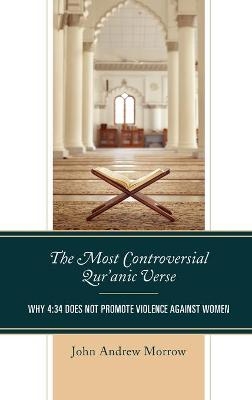
The Most Controversial Qur'anic Verse
Hamilton Books (Verlag)
978-0-7618-7209-2 (ISBN)
A fourteen centuries old consensus by Islamic religious authorities has upheld the belief that God has granted husbands the right to beat their wives. Previously, the only element up for debate was the degree of severity, the instrument of the beating, and the limit to the damage allowed. This startling assertion, which shocks human sensibilities, is confirmed by hundreds of Qur’anic commentaries and works of Islamic jurisprudence authored over the course of the past millennia and a half.
Despite the lies of propagandists and the ignorance of apologists, who claim that “Islam prohibits domestic violence,” the fact of the matter is that the Islamic Tradition and Law allow husbands to inflict corporal punishment on their wives. In fact, it was only in the late twentieth and early twenty-first centuries that a small number of translators and scholars started to insist upon alternate interpretations.
In this pivotal, courageous, and timely analysis, which works diligently and minutely to separate truth from falsehood, right from wrong, the moral from the immoral, and the ethical from the unethical, Dr. John Andrew Morrow provides an exhaustive study of the second part of the Quranic text, 4:34, the Wife Beating Verse.
Like Titan, who bears the weight of the heavens upon his shoulders, Morrow takes on the entire corpora of Islamic Tradition. With scientific precision, he interprets the verse by the verse, itself, the verse by related verses, the verse in the light of the Qur’an, the verse in light of prophetic traditions that permit domestic violence, the verse in light of other traditions that expressly prohibit violence against women, the verse in its historical context, the verse in light of reformist reinterpretations, the verse in light of the spirit of Islam, the verse from a Sufi perspective, and the verse in light of Qur’anic variants. Along the way, the author delicately and defiantly dispels misogynistic misinterpretations of the Word of God while slashing and burning the sexist sayings that were attributed to the Prophet Muhammad. In so doing, he may well save Islam from those traditionalists and misogynists who claim to speak in God’s name.
John Andrew Morrow was full professor of foreign languages at Ivy Tech Community College of Indiana.
Acknowledgments
Permissions
Observations
Preface
Introduction
Chapter One: Interpret the Verse by the Verse
Chapter Two: Interpret the Verse in Light of Directly Related Verses
Chapter Three: Interpret the Verse in Light of the Qur’ān as a Whole
Chapter Four: Interpret the Verse in Light of Prophetic Traditions that Prohibit Disciplinary Domestic Violence
Chapter Five: Interpret the Verse in Light of Prophetic Traditions Permitting Disciplinary Domestic Violence
Chapter Six: Interpret the Verse in its Historical Context
Chapter Seven: The Reformist Reinterpretation
Chapter Eight: Interpret the Verse in the Spirit of Islām as a Whole
Chapter Nine: Interpret the Verse Allegorically
Chapter Ten: Vocalization and Variants
Conclusions
Appendix 1: Predictors of Domestic Violence: Community and Societal Factors
Appendix 2: Predictors of Domestic Violence: Individual Factors
Appendix 3: Predictors of Domestic Violence: Relationship Factors
Appendix 4: Norms and Beliefs that Support Violence Against Women
Appendix 5: Assessing Risk in Domestic Violence Cases
Appendix 6: The Cycle of Violence
Appendix 7: Forms of Intimate Partner Violence
Appendix 8: When to Suspect Spousal Abuse
Appendix 9: Guiding Principles of Care for Healthcare Providers
Appendix 10: Why Women Stay with their Abusers
Appendix 11: When Women Leave
Appendix 12: Preventing Domestic Violence
Appendix 13: How to Help
Appendix 14: Combating Domestic Violence
Appendix 15: Is Islām Inherently Misogynistic?
Appendix 16: The Ṣūfī Prescription for Overcoming Domestic Violence
Works Cited
Index
About the Author
| Erscheinungsdatum | 10.05.2021 |
|---|---|
| Co-Autor | Charles Upton, Dr. Abdülaziz Bayindir |
| Verlagsort | Lanham, MD |
| Sprache | englisch |
| Maße | 162 x 239 mm |
| Gewicht | 708 g |
| Themenwelt | Geisteswissenschaften ► Religion / Theologie ► Islam |
| ISBN-10 | 0-7618-7209-4 / 0761872094 |
| ISBN-13 | 978-0-7618-7209-2 / 9780761872092 |
| Zustand | Neuware |
| Informationen gemäß Produktsicherheitsverordnung (GPSR) | |
| Haben Sie eine Frage zum Produkt? |
aus dem Bereich


